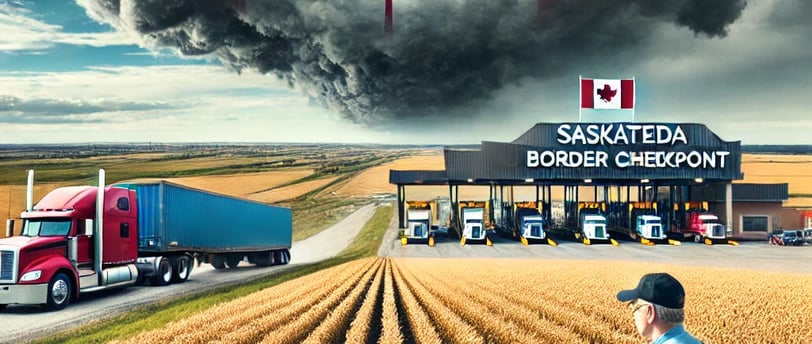🇨🇦 First for any help please mail: oneskca@gmail.com
Trump’s 25% Tariff: A Major Threat to Saskatchewan’s Economy
TRUMP TAX ON CANADA
Md Khaled Hossain, Data Science Professional, oneskca@gmail.com
2/2/20252 min read


The recent announcement of a 25% tariff on Canadian products by U.S. President Donald Trump poses a significant challenge to Saskatchewan’s economy. As a province heavily reliant on exports, particularly to the United States, this policy could have severe consequences for local businesses, farmers, and workers.
How Will This Tariff Affect Saskatchewan?
Agriculture at Risk
Saskatchewan is a major exporter of wheat, canola, lentils, and other agricultural products. The U.S. is one of our biggest buyers, and a 25% tariff could make our goods more expensive and less competitive in the American market. This could lead to reduced sales, lower income for farmers, and even job losses in the agricultural sector.Manufacturing and Trade Barriers
The province’s manufacturing sector, including machinery, mining equipment, and food processing, relies on trade with the U.S. Higher tariffs could force businesses to cut costs, potentially leading to layoffs or downsizing. It also discourages investment, making it harder for Saskatchewan-based companies to grow.Impact on Energy and Natural Resources
Saskatchewan is a key supplier of potash, uranium, and oil, with a significant portion going to the U.S. If tariffs are extended to these sectors, it could reduce demand for our resources, affecting provincial revenues and jobs in mining and energy industries.Higher Costs for Consumers and Businesses
Tariffs don’t just affect exporters—they increase costs for local businesses that rely on U.S. imports for machinery, technology, and raw materials. This could lead to price hikes, making it harder for Saskatchewan businesses to remain competitive.
What Can Saskatchewan Do?
To counter the negative impact of these tariffs, Saskatchewan needs to explore new trade opportunities and strengthen existing partnerships outside the U.S.
Expand Trade with Asia and Europe through agreements like the Comprehensive and Progressive Agreement for Trans-Pacific Partnership (CPTPP) and the Canada-European Union Comprehensive Economic and Trade Agreement (CETA).
Strengthen Domestic Markets by increasing interprovincial trade and local business support.
Government Action & Advocacy to push back against unfair tariffs and negotiate better trade terms for Canadian businesses.
Summary
Trump’s 25% tax on Canadian products threatens Saskatchewan’s economy, affecting farmers, businesses, and workers alike. The province must take decisive action to diversify markets, support local industries, and advocate for fair trade policies to protect its economic future.
Stay informed, stay united, and let’s work together to ensure Saskatchewan’s economy remains strong.